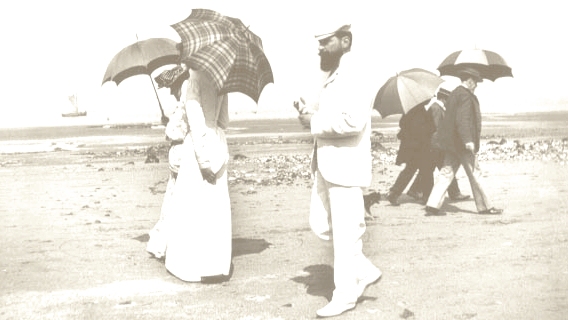Between 1845 and 1850, more than a million Irish people starved to death while massive quantities of food were being exported from their country. A half million were evicted from their homes during the potato blight, and a million and a half emigrated to America, Britain and Australia, often on-board rotting, overcrowded "coffin ships". This is the story of how that immense tragedy came to pass.
[...]
In Ireland Before and After the Famine, author Cormac O’Grada documents that in 1845, a famine year in Ireland, 3,251,907 quarters (8 bushels = 1 quarter) of corn were exported from Ireland to Britain. That same year, 257,257 sheep were exported to Britain. In 1846, another famine year, 480,827 swine, and 186,483 oxen were exported to Britain.
Cecil Woodham-Smith, considered the preeminent authority on the Irish Famine, wrote in The Great Hunger; Ireland 1845-1849 that, "...no issue has provoked so much anger or so embittered relations between the two countries (England and Ireland) as the indisputable fact that huge quantities of food were exported from Ireland to England throughout the period when the people of Ireland were dying of starvation."
"Although the potato crop failed, the country was still producing and exporting more than enough grain crops to feed the population. But that was a 'money crop' and not a 'food crop' and could not be interfered with."
According to John Mitchel, quoted by Woodham-Smith, "Ireland was actually producing sufficient food, wool and flax, to feed and clothe not nine but eighteen millions of people," yet a ship sailing into an Irish port during the famine years with a cargo of grain was "sure to meet six ships sailing out with a similar cargo."
One of the most remarkable facts about the famine period is that there was an average monthly export of food from Ireland worth 100,000 Pound Sterling. Almost throughout the five-year famine, Ireland remained a net exporter of food.
[...]
Dr. Christine Kinealy, a fellow at the University of Liverpool and the author of two scholarly texts on the Irish Famine: This Great Calamity and A Death-Dealing Famine, says that 9,992 calves were exported from Ireland to England during "Black'47", an increase of thirty-three percent from the previous year. In the twelve months following the second failure of the potato crop, 4,000 horses and ponies were exported. The export of livestock to Britain (with the exception of pigs) increased during the "famine". The export of bacon and ham increased. In total, over three million live animals were exported from Ireland between 1846-50, more than the number of people who emigrated during the famine years.
[...]
Dr. Kinealy's most recent work is documented in the spring, 1998 issue of "History Ireland". She states that almost 4,000 vessels carried food from Ireland to the ports of Bristol, Glasgow, Liverpool and London during 1847, when 400,000 Irish men, women and children died of starvation and related diseases. The food was shipped under guard from the most famine-stricken parts of Ireland: Ballina, Ballyshannon, Bantry, Dingle, Killala, Kilrush, Limerick, Sligo, Tralee and Westport.
Dr. Kinealy's research proves beyond a reasonable doubt that there was sufficient food in Ireland to prevent mass starvation, and that the food was brought through the worst famine-stricken areas on its way to England. British regiments guarded the ports and warehouses in Ireland to guarantee absentee landlords and commodity speculators their "free market" profits.
When Ireland experienced an earlier famine in 1782-83, ports were closed in order to keep home grown food for domestic consumption. Food prices were immediately reduced within Ireland. The merchants lobbied against such efforts, but their protests were over-ridden. Everyone recognized that the interests of the merchants and the distressed people were irreconcilable. In the Great Famine, that recognition was disregarded.
[...]
Charles Edward Trevelyan, the British Treasury Secretary in charge, was the civil servant most involved in Irish famine relief. He firmly believed in the economic principles of laissez-faire, or noninterference by the government. Trevelyan opposed expenditure and raising taxes, advocating self-sufficiency. He was convinced of Malthus' theory that any attempt to raise the standard of living of the poorest section of the population above subsistence level would only result in increased population which would make matters worse.
In October, 1846, Trevelyan wrote that the overpopulation of Ireland "being altogether beyond the power of man, the cure has been applied by the direct stroke of an all-wise Providence in a manner as unexpected and as unthought of as it is likely to be effectual." Two years later after perhaps a million people had died, he wrote, "The matter is awfully serious, but we are in the hands of Providence, without a possibility of averting the catastrophe if it is to happen. We can only wait the result." Later that year Trevelyan declared: "The great evil with which we have to contend is not the physical evil of the famine, but the moral evil of the selfish, perverse and turbulent character of the people." In 1848 Trevelyan was knighted for his services in Ireland.
The Great Irish Famine
Nebraska Department of Education



